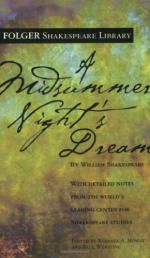|
This section contains 8,466 words (approx. 29 pages at 300 words per page) |

|
SOURCE: Wyrick, Deborah Baker. “The Ass Motif in The Comedy of Errors and A Midsummer Night's Dream.” Shakespeare Quarterly 33, no. 4 (winter 1982): 432-48.
In the following essay, Wyrick explores the symbolism associated with the ass motif in A Midsummer Night's Dream and examines how the word “ass” is used to create a complex code that is the key to many of the play's themes.
One of the most ubiquitous epithets in Shakespearean drama is “ass.” Since it carries the primary significance of an ignorant fellow, a perverse fool, or a conceited dolt, the word can be counted upon to stimulate audience laughter.1 The frequency of its appearance in Shakespeare's plays, however, makes one suspect that it is a word rich in thematic associations and in dramatic applications.2 Far from functioning merely as a simple synonym for a stupid blunderer, the word “ass”—whether used as a simile, as a...
|
This section contains 8,466 words (approx. 29 pages at 300 words per page) |

|


